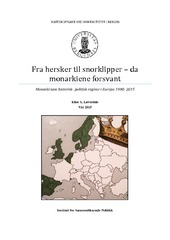| dc.contributor.author | Løvereide, Elise Adeleine | eng |
| dc.date.accessioned | 2015-11-20T13:40:28Z | |
| dc.date.available | 2015-11-20T13:40:28Z | |
| dc.date.issued | 2015-06-02 | |
| dc.date.submitted | 2015-06-02 | eng |
| dc.identifier.uri | https://hdl.handle.net/1956/10667 | |
| dc.description.abstract | My thesis examines the monarchy as a historical and political type of regime, including the abolishing of the monarchies in 20th century Europe. There were only three republics in Europe in the year 1900, while the rest were monarchies. By contrast, only twelve countries remain monarchies today. In conjunction with my case overview, 22 countries abolished the monarchy in the 115 years period. My research question is therefore why some countries retained the monarchy in Europe while most of them did not. In developing hypotheses for this research question, I have generated four main independent variables. These are defeat in war, revolution, electoral fraud, and the monarchs' lack of yield to parlamentarism. My assumption is that countries that experienced these were more likely to abolish their monarchies. If the king were on the losing side in wars, suppressed his population, tried to achieve more executive power, and/ or worked against the parliamentary process, he would more likely be deposed or exiled. The variables also imply that non- violent and consensus- based transitions to democracy will be in favor of the monarchy compared to violent ones. Based on Stepan, Linz and Minoves' study of democratic parliamentary monarchies (2014), I will use and discuss their regime typology. This typology distinguishes monarchies in three respects, the ruling monarchy, the constitutional monarchy, and the democratic parliamentary monarchy. The latter describes the surviving monarchies in today's Europe (with the exception of Liechtenstein and the Vatican State). The thesis is two- fold. The first part is a csQCA- analysis, seeking patterns in historical context. The second part is case-oriented and will explore Spain and Greece in a case study. These cases are chosen because they both shifted their regime type between republic and monarchy and both monarchies survived the World Wars. But unlike Spain, who kept her monarchy after the death of Franco in 1975 - Greece abolished the monarchy in 1973 and the king went in exile in 1967. Both countries constitute crucial cases. These two methods complement each other into a more valid finding of why monarchy became regarded as an expired type of regime through the 20th century. | en_US |
| dc.description.abstract | Oppgaven studerer monarki som en historisk og politisk regimetype i Europa, og undersøker avviklingen av monarkiet i det 20. århundret. I år 1900 var kun tre land i Europa republikker, mens resten var monarkier. I kontrast er det kun 12 gjenværende monarkier på kontinentet i dag. I sammenheng med min caseoversikt, avviklet 22 land monarkiet i løpet av den 115 år lange perioden. Mitt forskningsspørsmål er derfor hvorfor noen land beholdt monarkiet mens de fleste andre fjernet det. For å søke svar på forskningsspørsmålet har jeg utviklet fire uavhengige variabler: Revolusjon, krigsnederlag, valgmanipulasjon og monarkens motstand mot parlamentarisme. Antakelsen er at land som opplevde disse, mer sannsynlig avviklet monarkiet. Dersom kongen var på tapende side i krig, undertrykket sin befolkning, forsøkte å øke sin utøvende makt og motsatte seg parlamentarismen, var det større sannsynlighet for at han ble avsatt. Antakelsen innebærer også at fredelige, konsensusbaserte overganger til demokrati går mer i favør til monarkiet enn voldelige overganger. Oppgaven vil ta utgangspunkt i Stepan m.fl. (2014) sin regimetypologi av monarkier, hvor monarkiet kategoriseres i tre typer: Eneveldig monarki, konstitusjonelt monarki og demokratisk parlamentarisk monarki. Sistnevnte beskriver de overlevende monarkiene i dagens Europa, med unntak av Vatikanstaten og Liechtenstein. Studien er todelt: Første del er en csQCA- analyse som skal søke etter mønstre i den historiske konteksten. Den andre delen er en komparativ casestudie av Spania og Hellas. Begge land skriftet regimetype mellom monarki og republikk i den valgte perioden, og begge monarkiene overlevde verdenskrigene. Men i motsetning til Spania, som beholdt sitt monarki ved Francos død i 1975, avviklet Hellas sitt monarki i 1973. De to metodene vil kunne komplementere hverandre og samlet bevilge mer solide funn for hvorfor monarkiet ble ansett som en utdatert regimetype i det 20. århundret. | en_US |
| dc.format.extent | 1596589 bytes | eng |
| dc.format.mimetype | application/pdf | eng |
| dc.language.iso | nob | eng |
| dc.publisher | The University of Bergen | eng |
| dc.subject | regime | eng |
| dc.subject | monarchies | eng |
| dc.subject | republics | eng |
| dc.subject | electoral fraud | eng |
| dc.subject | revolution | eng |
| dc.subject | war | eng |
| dc.subject | executive power | eng |
| dc.subject | csQCA- analysis | eng |
| dc.subject | case-oriented | eng |
| dc.title | Fra hersker til snorklipper - da monarkiene forsvant. Monarki som historisk- politisk regime i Europa 1900- 2015 | eng |
| dc.type | Master thesis | en_US |
| dc.rights.holder | Copyright the author. All rights reserved. | en_US |
| dc.description.degree | Master i Sammenliknende politikk | |
| dc.description.localcode | SAMPOL350 | |
| dc.description.localcode | MASV-SAPO | |
| dc.subject.nus | 731114 | eng |
| fs.subjectcode | SAMPOL350 | |
